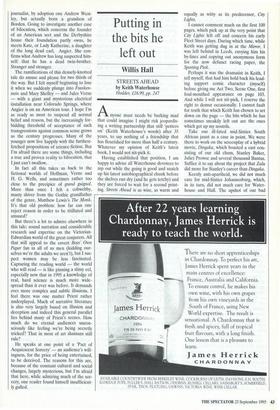Two faces at once
John Fowles
THE PRESTIGE by Christopher Priest Touchstone, £15.99, pp. 404 The literary world has grown so clever that to call a novel a good yarn would evoke distaste at such out-of-date usage in most academics and anger in the writer. It seems worse in my own case since they put my name on the front jacket. Some years ago I called Christopher Priest 'one of our most gifted writers'. I wouldn't withdraw that. The Prestige is a complex and intrigu- ing yarn, in the same general tradition as Dr Jekyll and Mr Hyde. If I have some reservations now, they are less about the writer than the way our world changes. More precisely, about the thoroughness of expertise in mimicking reality we audiences now expect of our tale-tellers and enter- tainers.
First of all, that title. It carries an older meaning, now forgotten, from the Latin praestigium; an illusion, a deception, a con- jurer's trick. It is around the last that the novel gathers its momentum, recounting the bitter rivalry between two professional magicians, who both develop a clever trick called the New Transported Man. In it they pretend bilocation, the impossibility beloved of spiritists, séance-holders and believers in the Gaelic sixth sense — a same body's capacity to be in different places simultaneously. One clever trickster is Andrew Borden, born in 1856. His con- temporary and fellow eyewasher is Rupert Angier, who does his act under that name, but is really an earl. Most of the narrative deals in twin diary flashbacks with the con- volvular intertwining of their careers. The two are first introduced by a contemporary journalist, by adoption one Andrew West- ley, but actually born a grandson of Borden. Going to investigate another case of bilocation, which concerns the founder of an American sect and the Derbyshire house their foundation partly owns, he meets Kate, or Lady Katherine, a daughter of the long dead earl, Angier. She con- firms what Andrew has long suspected him- self: that he has a dead twin-brother. Stranger and stranger.
The ramifications of this densely-knotted tale do amuse and please for two thirds of the way. But I felt myself beginning to lose it when we suddenly plunge into Franken- stein and Mary Shelley — and Jules Verne — with a giant and mysterious electrical installation near Colorado Springs, where Angier is on an American tour. I hope I'm as ready as most to suspend all normal belief and reason, but the increasingly for- bidding threshold of acceptance of such transgressions against common sense grows as the century progresses. Many of the younger now live happily with the furthest- fetched propositions of science-fiction. But I'm afraid there are some things, including a true and proven reality to bilocation, that I just can't swallow.
In fact all this takes us back to the fictional worlds of Hoffman, Verne and H. G. Wells, and sometimes rather too close to the precipice of grand guignol. More than once I felt a cobwebby, musty shiver from the Gothic grandfather of the genre, Matthew Lewis's The Monk. It's that old problem: how far can one reject reason in order to be titillated and amused?
But there's a lot to admire elsewhere in this tale: sound narration and considerable research and expertise on the Victorian- Edwardian world of the great conjurers. All that will appeal to the covert Boys' Own Paper fan in all of us men (kidding our- selves we're the adults we aren't), but I sus- pect women may be less fascinated.
Capturing the reading world — the world who will read — is like pinning a slimy eel, especially now that in 1995 a knowledge of real, hard science is much more wide- spread than it ever was before. It demands ever more complex and subtle illusions. I feel there was one matter Priest rather underplayed. Much of narrative literature is also very largely based on illusion and deception and indeed this general parallel lies behind many of Priest's scenes. How much do we eternal audiences uncon- sciously like feeling we're being secretly tricked? That in most of art shamans still rule?
He speaks at one point of a 'Pact of Acquiescent Sorcery' — an audience's will- ingness, for the price of being entertained, to be deceived. The reasons for this are, because of the constant cultural and social changes, largely mysterious, but I'm afraid that here, while admiring much of the sor- cery, one reader found himself insufficient- ly gulled.



































































 Previous page
Previous page